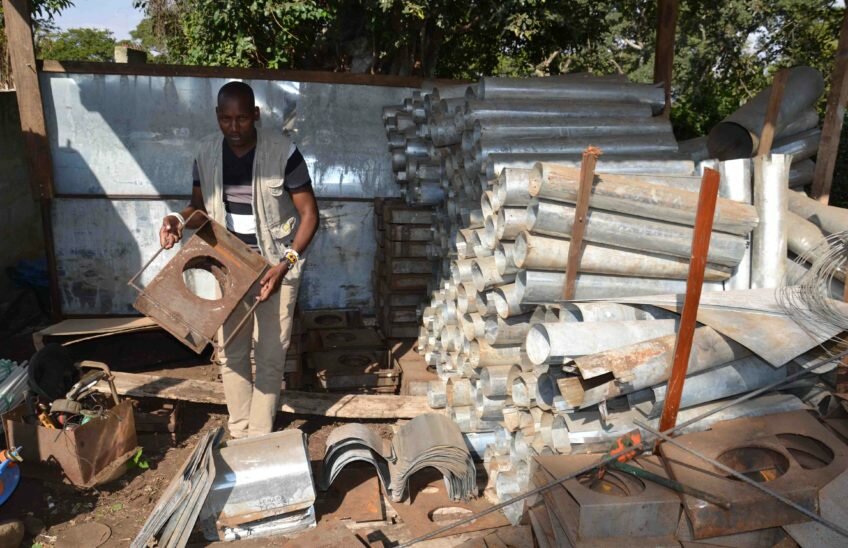Kisioki displays one of the energy-efficient cook stoves he makes . Photo credit: Craig Davis/Africa Lead
Thirty-one year-old youth activist and director of the non-profit International Collaborative for Science, Education and the Environment (ICSEE), Kisioki Moitiko, believes that youth unemployment is the greatest threat facing Maasai communities in Tanzania today. Linked to unemployment, however,are a number of other obstacles that we must address simultaneously, including recurrent drought, environmental degradation, malnutrition, unclean drinking water, poor marketing strategies, lack of marketable job skills, and traditional beliefs that undervalue women, among others. With Kisioki’s leadership, since 2009, ICSEE has launched a number of grassroots initiatives designed to tackle some of these obstacles in Enguiki Village and the Saitoti Boma.
For instance, ICSEE has provided energy-efficient cook stoves in 4,000 homes. These stoves require 60% less wood and minimize smoke inside the homes. Speaking of the advantages of her new stove, one mother said, “I save money on oil… and my children are not sick as often as they used to be.” The program has also installed 400 watt solar panel systems in 40 communities that provide electricity to 2,000 homes. Kisioki has trained a workforce of 220 Maasai women as installers and repairwomen of the stoves and solar panel units. In turn, he has helped these women form investment groups that buy livestock, fatten the animals, and sell them at a profit. When asked how this improved livelihood impacted her family, one installer said, “I can now afford to buy my children uniforms and send them to school.”
In addition to the stove and solar panel projects, and the women’s financial empowerment initiative, ICSEE has initiated a water sanitation activity, opened two grinding mills that employ four women each month on a rotating basis, and launched a pilot livestock fattening project. ICSEE has also partnered with Canadian philanthropists to launch a granary where Maasai community members can store their grain during low market periods and sell when the market price increases.
In 2016, Kisioki returned from six weeks in the United States as a YALI (Young African Leadership Initiative) fellow with new skills, experiences, and fresh ideas that he wanted to apply. He says, “There are many hidden opportunities” that the Maasai cannot see. He hopes to reveal those opportunities in pilot projects so that his community can see the value themselves. Kisioki hopes to show “the Maasai men that women can do the things that men do… Do business, earn money… improve their homes.”
Most recently Kisioki acquired a vocational training center, where ICSEE will provide sewing and English courses for youth. He hopes to increase the number of stoves to 10,000 households over the next five years and wants to provide more jobs and services to the Maasai community.
To achieve these goals, Kisioki realizes that he and the organization require additional technical skills to consolidate their efforts, plan strategically, and ensure sustainability. He admits that he needs project and financial management training. In his previous profession, Kisioki says, “I was a safari guide and a driver.” So he welcomes the technical support.
Kisioki checking on a control unit for one of the installed solar panels: Photo credit: Craig Davis/Africa Lead
Africa Lead (AL) is complementing previous USAID investments in young leaders like Kisioki by providing a technical support package designed to strengthen strategic planning and sustainability. Over the next six months, AL will provide NGO capacity strengthening in the form of hands-on financial management, donor mapping, and proposal writing support. Africa Lead has also started linking Kisioki with other young NGO leaders in the region to conduct site visits, share experiences, and learn from each other. Finally, AL will provide monthly mentoring.
“Africa Lead’s support will take my skills to another level,” Kisioki says. “It will have a positive impact on our work.”
